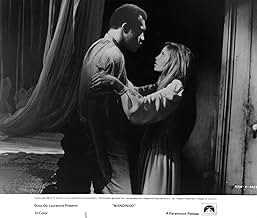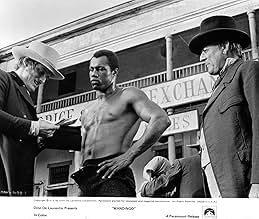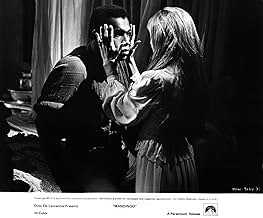VALUTAZIONE IMDb
6,5/10
4507
LA TUA VALUTAZIONE
Nell'America del 1840, uno schiavista addestra uno dei suoi schiavi per farlo diventare un pugile di boxe a mani nude.Nell'America del 1840, uno schiavista addestra uno dei suoi schiavi per farlo diventare un pugile di boxe a mani nude.Nell'America del 1840, uno schiavista addestra uno dei suoi schiavi per farlo diventare un pugile di boxe a mani nude.
- Regia
- Sceneggiatura
- Star
- Premi
- 1 vittoria in totale
Debbi Morgan
- Dite
- (as Debbie Morgan)
Recensioni in evidenza
This unflinching, hard-hitting look at slavery is a severely underrated and misjudged film. That's probably because it sheds light onto a tough, painful subject that many people would prefer to ignore or forget; if you're expecting a "slaves-and-masters-are-all-a-big-happy-family" depiction of the life in the mid-19th-century Southern plantations, then this simply isn't your movie.
"Mandingo" was followed, one year later, by "Drum". They are both far better films than their reputations might make you believe, and they are also handsome, almost sumptuous productions with a far lower "sleaze" quotient than many reviews seem to indicate. They are both worth seeing - preferably as a double bill. (***)
"Mandingo" was followed, one year later, by "Drum". They are both far better films than their reputations might make you believe, and they are also handsome, almost sumptuous productions with a far lower "sleaze" quotient than many reviews seem to indicate. They are both worth seeing - preferably as a double bill. (***)
This movie is a disturbing look at the realities of the antebellum South. And yes, I do believe the depictions and events in this movie are realistic. Such atrocities are well-documented. Both the movie and the book contain graphic violence, sex, and rape. The movie is sometimes difficult to watch, but it's worth watching, for anyone who ponders the evils of humanity and especially the history of the U.S. during the 1800's. The acting and film quality aren't upper echelon. The dialogue is sometimes excessively histrionic. But that's not what's so good about this movie. It's gritty, realistic, and brutally honest.
As I watched, I realized that maybe things haven't changed so much since those times. Racism and sexism are still very much alive. You can easily compare the attitudes and behaviors depicted in this film with things that go on in our society today. Some people have commented that Blanche was "oversexed". I find that a rather hilarious statement. They obviously don't get the feminist subplot of this movie. The way it depicts and breaks down racism and sexism and shows exactly why they're faulted ideologies is why I love this movie so much!
As I watched, I realized that maybe things haven't changed so much since those times. Racism and sexism are still very much alive. You can easily compare the attitudes and behaviors depicted in this film with things that go on in our society today. Some people have commented that Blanche was "oversexed". I find that a rather hilarious statement. They obviously don't get the feminist subplot of this movie. The way it depicts and breaks down racism and sexism and shows exactly why they're faulted ideologies is why I love this movie so much!
This film, despite some controversy about it's biracial sex scenes when it was initially released, seems to have faded from memory. Given the degree of sex, violence, and unadulterated exploitation of slavery in the antebellum South, that's a surprise, because I saw this flick nearly ten years ago and STILL can't forget it! Those whose image of the old South has forever been defined by GONE WITH THE WIND as romantic and chivalrous and pick up this movie in the video store(the cover art on the box resembles that famous pose with Gable and Leigh)thinking they're about to be trasported to Tara ought to run like Hell! James Mason and his lame son Perry King live on a plantation and own slaves body and soul. Well, at least the body part, as we see when Mason strings an errant slave upside down, strips him, and pattles his butt with a perforated paddle. Son King takes a more tender approach, as he sleeps with the female slaves, especially Brenda Sykes, whom he takes as his mistress. However, he marries Susan George to provide an heir, and presents her with a ruby choker. He also gives Sykes the matching earrings. When George learns of the relationship(Sykes wears the earrings while she serves dinner to George and King on their first night at the plantation), and Kings learns George has slept with her brother, the marriage hits the skids. George drowns her sorrows in lots of sherry and lots of Ken Norton, a slave Perry has purchased specifically for fighting other slaves for betting. George becomes pregnant, and when the baby comes, it hits the fan! It's hard to believe that anyone in 1975 could see this film as anything but exploitation of a very dark period in American history. Didn't anyone cringe at the sight of King going in to "take pleasure" from a female slave in a bed and the woman groans, "I too black for you", or Ken Norton standing stoically on the auction block of a slave sale while an old woman gropes around inside his loincloth? The video edition of this film I saw was from the early eighties, when movie studios did their transfers from the first worn-out prints the could grab, and may have had a muddy, faded look because of this, but it's hard to believe this thing came from a major studio. You'd certainly wouldn't know it from the production values, because the film looks as if the filmmakers didn't spend a penny more than they had to(we're treated to interior scenes inside a plantation house curiously devoid of furniture). With all these setbacks, it's hard to understand why this movie hasn't garnered even a semi-cult following. If you're in the mood to be offended on all levels and don't treasure some romanticized Hollywood image of the old South, grab MANDINGO.
1975's "Mandingo" earned much scorn from such highbrow critics as Roger Ebert, such was its unflinching look at slave relations in the Antebellum South, including numerous interracial couplings featuring full frontal nudity. The series of Falconhurst novels began with Kyle Onstott's original 1958 publication of "Mandingo," named for a specific type of fighter from the West African Niger region, also known for its later use by Alex Haley in his largely fictional yet compelling family history "Roots," the miniseries still two years away from its debut broadcast. Producer Dino De Laurentiis spent a number of years trying to finalize a deal, and with the relaxation of the old ratings system could never have filmed such a sordid tale until the 70s, a decade of untold exploitation where 'anything goes,' and often did. Director Richard Fleischer initially turned the assignment down but finally relented, James Mason earning top billing as plantation owner Warren Maxwell, in a role rejected by James Cagney and Charlton Heston, Perry King as son Hammond in place of Jan-Michael Vincent, Jeff Bridges, Beau Bridges, and Timothy Bottoms. Hammond is mostly portrayed as a sympathetic figure toward his slaves, often at odds with his harder edged father, his subsequent marriage to cousin Blanche (Susan George) soured on their wedding night by her less than virginal countenance under the sheets (as was so often the case, the girl was deflowered by her own brother). Hammond's purchase of new 'bed wench' Ellen (Brenda Sykes) does not go unnoticed by an increasingly irrational Blanche, eventually taking revenge on her faithless spouse by summoning Mandingo fighter Mede (Ken Norton) to her bed, producing a non white child that is quietly allowed to bleed to death, poor Blanche poisoned and defenseless Mede shot, scalded, and butchered by pitchfork. Critics were appalled by the brutality of Norton's no holds barred fight scenes, and the nihilistic climax left audiences appropriately stunned, a game cast putting forth a great effort to bring such unhappiness to vivid life. Interiors are effectively dark and gloomy, furniture sparse and guests rarely in evidence, slaves variously bought and sold to keep the rundown plantation afloat (location shooting in Louisiana). Susan George gives an uncanny rendition of Bette Davis in a part that few actresses would brave, and even at the end still earns sympathy making tearful entreaties to her unfeeling husband. James Mason and Perry King also acquit themselves well, as does Richard Ward as the intelligent Agamemnon punished for being able to read, and Ji-Tu Cumbuka, later Kunta Kinte's Wrestler on ROOTS, making the strongest impression as a runaway slave who prefers death to a life enchained. Personal preference impacts how one sees this picture, slowly gaining increased stature over the years, and certainly better than its immediate sequel "Drum," Ken Norton returning as a new character.
I can see why this was controversial, and no doubt it would be if it were released now (2013). It's stunningly unlike Gone with the Wind. The style is extreme Southern Gothic, (not to be confused with camp). Some shades of Tennessee Williams but goes beyond where he dared. The dialogue is a bit difficult, and DVD has no English subtitles, but you'll be rewarded if you stick with it. (No need to understand every word). I agree that Tarantino was influenced by it but his approach to the subject matter is very different. Mandingo stands on its own as a major work of the 1970s and it's certainly a film that deserves to be better known. Striking photography and music throughout. This film panders to no one, nor does it simplistically tell the viewer what to think about anything. We have the feeling we're on our own with this. Maybe it's no accident that that feels liberating. Fasten your seat belts and see it.
Lo sapevi?
- QuizJames Mason admitted in interviews that he only made the film to make his alimony payments.
- BlooperDuring Mede's first fight in the city, he and his opponent are wrestling on the grass. When they roll over on the floor, the grass moves like a slipping carpet would, revealing it to be a sheet of artificial green, probably lying on the floor of a sound stage.
- Versioni alternativeThe international version of the film (released on PAL region 2 DVD) contains a different cut of the film that runs approx. 5 minutes shorter than the U.S. release but also has many scenes presented in alternate clothed takes. In all 12 scenes were either trimmed or re-edited with alternate shots/angles/takes:
- Scene where slave is bent over and inspected for hemorrhoids is cut.
- Scene where the wench is being prepared for her deflowering is presented in an alternate take where her breasts are not exposed.
- Scene with pregnant wench is shot with alternate angles to obscure nudity. Perry King's full frontal nudity is cut and replaced with a closer shot that reveals he is wearing shorts when he kneels down to pray (It looks like a goof - only a bit of the waistband can be seen at the corner of the frame).
- Alternate takes of the slave being strung up to be beaten are used to obscure nudity, and many shots of him being beat and left bloody are cut.
- A few seconds where Perry King's cousin rips off a wench's dress and bends her over to begin beating her is cut to remove nudity. The beating is left intact.
- The slave market scene is edited to remove the topless wenches on display, and the shot where the German widow sticks her hand into Ken Norton's shorts and "inspects" him is cut short. The second shot with her hand in and then removing it is left intact though.
- An alternate take is used with a prostitute clothed rather than nude at the bawdy house.
- A few seconds of a prostitute rubbing on Perry King's crotch is cut.
- An alternate take is used during the fight at the bawdy house so that a prostitute is seen holding her dress up while she cheers whereas in the original she lets it fall and her breasts be exposed.
- The entire scene between Perry King and Brenda Sykes in which she asks him if he'll let their child go free is presented in alternate clothed takes. In the original film they are both completely nude. Even the camera angles and setups are the same, only with clothes in the international version.
- In the scene where Ken Norton fights a man to death one long shot where the other fighter claws his back is cut. Also cut is when Ken bites down on the other fighter's neck, is pulled off, and then bites into his neck again. All the close-ups are cut.
- The Susan George/Ken Norton love scene is almost entirely missing. Ken Norton's nudity is cut, and then the scene ends in an alternate take when the two go out of frame onto the bed. The original scene went on for much longer and exposed Ken Norton's buttocks and Susan George's breasts. The German theatrical version does not feature any of these alterations and is identical to the U.S. release.
- ConnessioniFeatured in Una tenera primavera (1979)
- Colonne sonoreBorn in This Time
Music by Maurice Jarre
Lyrics by Hitide Harris (as Hi Tide Harris)
Sung by Muddy Waters
[Played during opening title and credits]
I più visti
Accedi per valutare e creare un elenco di titoli salvati per ottenere consigli personalizzati
- How long is Mandingo?Powered by Alexa
- What are the differences between the International Version and the US DVD/BD by Legend Films/Paramount?
Dettagli
- Data di uscita
- Paese di origine
- Lingue
- Celebre anche come
- Bitmeyen Kavga
- Luoghi delle riprese
- Aziende produttrici
- Vedi altri crediti dell’azienda su IMDbPro
Botteghino
- Lordo Stati Uniti e Canada
- 2.433.010 USD
- Tempo di esecuzione2 ore 7 minuti
- Mix di suoni
- Proporzioni
- 1.85 : 1
Contribuisci a questa pagina
Suggerisci una modifica o aggiungi i contenuti mancanti




































